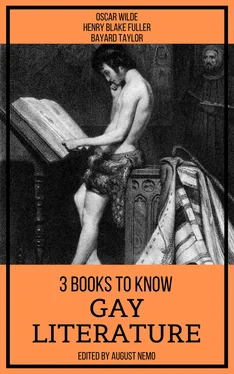After about a quarter of an hour Hallward stopped painting, looked for a long time at Dorian Gray, and then for a long time at the picture, biting the end of one of his huge brushes, and frowning. “It is quite finished,” he cried at last, and stooping down he wrote his name in long vermilion letters on the left-hand corner of the canvas.
Lord Henry came over and examined the picture. It was certainly a wonderful work of art, and a wonderful likeness as well.
“My dear fellow, I congratulate you most warmly,” he said. “It is the finest portrait of modern times. Mr. Gray, come over and look at yourself.”
The lad started, as if awakened from some dream. “Is it really finished?” he murmured, stepping down from the platform.
“Quite finished,” said the painter. “And you have sat splendidly to-day. I am awfully obliged to you.”
“That is entirely due to me,” broke in Lord Henry. “Isn’t it, Mr. Gray?”
Dorian made no answer, but passed listlessly in front of his picture, and turned towards it. When he saw it he drew back, and his cheeks flushed for a moment with pleasure. A look of joy came into his eyes, as if he had recognised himself for the first time. He stood there motionless and in wonder, dimly conscious that Hallward was speaking to him, but not catching the meaning of his words. The sense of his own beauty came on him like a revelation. He had never felt it before. Basil Hallward’s compliments had seemed to him to be merely the charming exaggerations of friendship. He had listened to them, laughed at them, forgotten them. They had not influenced his nature. Then had come Lord Henry Wotton with his strange panegyric on youth, his terrible warning of its brevity. That had stirred him at the time, and now, as he stood gazing at the shadow of his own loveliness, the full reality of the description flashed across him. Yes, there would be a day when his face would be wrinkled and wizen, his eyes dim and colourless, the grace of his figure broken and deformed. The scarlet would pass away from his lips, and the gold steal from his hair. The life that was to make his soul would mar his body. He would become dreadful, hideous, and uncouth.
As he thought of it, a sharp pang of pain struck through him like a knife, and made each delicate fibre of his nature quiver. His eyes deepened into amethyst, and across them came a mist of tears. He felt as if a hand of ice had been laid upon his heart.
“Don’t you like it?” cried Hallward at last, stung a little by the lad’s silence, not understanding what it meant.
“Of course he likes it,” said Lord Henry. “Who wouldn’t like it? It is one of the greatest things in modern art. I will give you anything you like to ask for it. I must have it.”
“It is not my property, Harry.”
“Whose property is it?”
“Dorian’s, of course,” answered the painter.
“He is a very lucky fellow.”
“How sad it is!” murmured Dorian Gray, with his eyes still fixed upon his own portrait. “How sad it is! I shall grow old, and horrible, and dreadful. But this picture will remain always young. It will never be older than this particular day of June. . . . If it were only the other way! If it were I who was to be always young, and the picture that was to grow old! For that — for that — I would give everything! Yes, there is nothing in the whole world I would not give! I would give my soul for that!”
“You would hardly care for such an arrangement, Basil,” cried Lord Henry, laughing. “It would be rather hard lines on your work.”
“I should object very strongly, Harry,” said Hallward.
Dorian Gray turned and looked at him. “I believe you would, Basil. You like your art better than your friends. I am no more to you than a green bronze figure. Hardly as much, I daresay.”
The painter stared in amazement. It was so unlike Dorian to speak like that. What had happened? He seemed quite angry. His face was flushed and his cheeks burning.
“Yes,” he continued, “I am less to you than your ivory Hermes or your silver Faun. You will like them always. How long will you like me? Till I have my first wrinkle, I suppose. I know, now, that when one loses one’s good looks, whatever they may be, one loses everything. Your picture has taught me that. Lord Henry Wotton is perfectly right. Youth is the only thing worth having. When I find that I am growing old, I shall kill myself.”
Hallward turned pale, and caught his hand. “Dorian! Dorian!” he cried, “don’t talk like that. I have never had such a friend as you, and I shall never have such another. You are not jealous of material things, are you? — you who are finer than any of them!”
“I am jealous of everything whose beauty does not die. I am jealous of the portrait you have painted of me. Why should it keep what I must lose? Every moment that passes takes something from me, and gives something to it. Oh, if it were only the other way! If the picture could change, and I could be always what I am now! Why did you paint it? It will mock me some day — mock me horribly!” The hot tears welled into his eyes; he tore his hand away, and, flinging himself on the divan, he buried his face in the cushions, as though he was praying.
“This is your doing, Harry,” said the painter, bitterly.
Lord Henry shrugged his shoulders. “It is the real Dorian Gray — that is all.”
“It is not.”
“If it is not, what have I to do with it?”
“You should have gone away when I asked you,” he muttered.
“I stayed when you asked me,” was Lord Henry’s answer.
“Harry, I can’t quarrel with my two best friends at once, but between you both you have made me hate the finest piece of work I have ever done, and I will destroy it. What is it but canvas and colour? I will not let it come across our three lives and mar them.”
Dorian Gray lifted his golden head from the pillow, and with pallid face and tear-stained eyes looked at him, as he walked over to the deal painting-table that was set beneath the high curtained window. What was he doing there? His fingers were straying about among the litter of tin tubes and dry brushes, seeking for something. Yes, it was for the long palette-knife, with its thin blade of lithe steel. He had found it at last. He was going to rip up the canvas.
With a stifled sob the lad leaped from the couch, and, rushing over to Hallward, tore the knife out of his hand, and flung it to the end of the studio. “Don’t, Basil, don’t!” he cried. “It would be murder!”
“I am glad you appreciate my work at last, Dorian,” said the painter, coldly, when he had recovered from his surprise. “I never thought you would.”
“Appreciate it? I am in love with it, Basil. It is part of myself. I feel that.”
“Well, as soon as you are dry, you shall be varnished, and framed, and sent home. Then you can do what you like with yourself.” And he walked across the room and rang the bell for tea. “You will have tea, of course, Dorian? And so will you, Harry? Or do you object to such simple pleasures?”
“I adore simple pleasures,” said Lord Henry. “They are the last refuge of the complex. But I don’t like scenes, except on the stage. What absurd fellows you are, both of you! I wonder who it was defined man as a rational animal. It was the most premature definition ever given. Man is many things, but he is not rational. I am glad he is not, after all: though I wish you chaps would not squabble over the picture. You had much better let me have it, Basil. This silly boy doesn’t really want it, and I really do.”
“If you let anyone have it but me, Basil, I shall never forgive you!” cried Dorian Gray; “and I don’t allow people to call me a silly boy.”
“You know the picture is yours, Dorian. I gave it to you before it existed.”
Читать дальше












